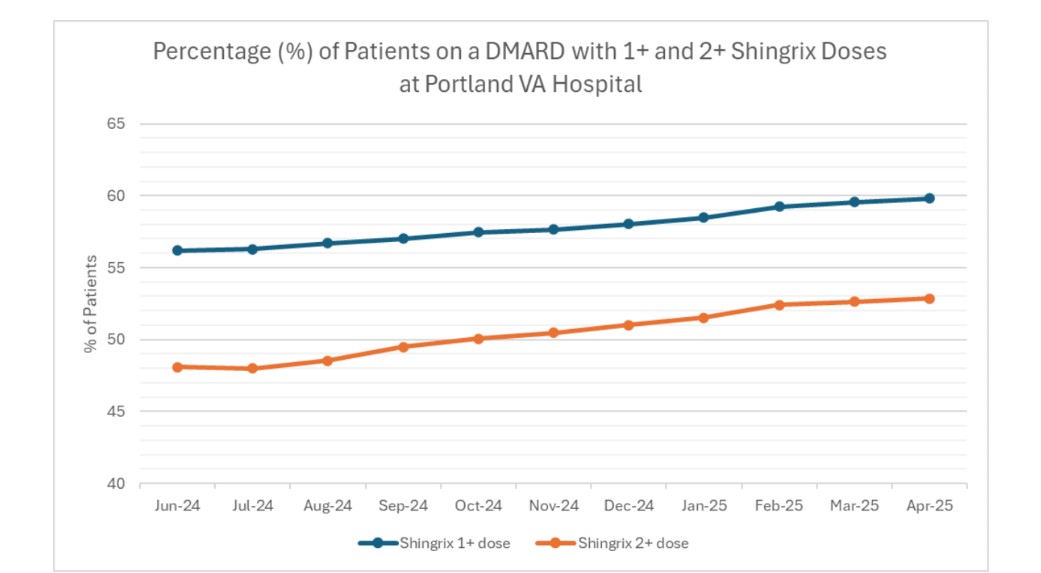Session Information
Date: Sunday, October 26, 2025
Title: (0210–0232) Measures & Measurement of Healthcare Quality Poster I
Session Type: Poster Session A
Session Time: 10:30AM-12:30PM
Background/Purpose: Disease-modifying antirheumatic drugs (DMARDs) are used to treat many rheumatologic diseases by modulating the patient’s immune system. However, patients on DMARDs are more susceptible to infection, including varicella zoster or shingles. ACR guidelines state adults aged 19 and older who are prescribed DMARD therapy should receive two doses of the Shingrix vaccine to protect against shingles. We aimed to improve Shingrix vaccine immunization among Veterans on DMARDs at the VA Portland Health Care System (VAPORHCS) using a medication safety dashboard.
Methods: We accessed the Rheumatology Medication Safety Shingrix Dashboard developed by the San Francisco VA Measurement Science QUERI, which was available to us as part of a wait-list control randomized trial. Using data from the dashboard, we identified patients who received a DMARD through the VA Portland Health Care System and reviewed EHR charts to confirm medication use and Shingrix vaccination status or refusal. Templated, secure emails were sent to the patients’ VA primary care providers and nurse care managers, highlighting the importance of Shingrix (Figure). Progress was tracked from June 2024 to April 2025 via the dashboard to monitor changes in the proportion of patients with immunizations and through chart review of patients whose PCPs were emailed, to confirm whether they received the Shingrix vaccine.
Results: From June 2024 to April 2025, the percentage of patients on a DMARD who received at least one dose of Shingrix increased from 56.2% to 59.8%—an overall rise of 3.6% (Graph). The percentage of patients fully vaccinated (both doses) increased from 48.1% to 52.9%, representing a 4.8 percentage point gain over the same period.On a monthly basis, the proportion of patients receiving only one dose rose by 0.013%, while those completing both doses increased by about 0.018% per month. Over the 11-month period, there is an increase of 6.4% in one-dose coverage and a 9.9% increase in two-dose coverage. The gap between the first and second Shingrix doses steadily declined over 11 months, from 8.1% in June 2024 to 7.0% in April 2025, demonstrating that patients who received the first dose of the vaccine also went on to get the second dose. During the period when the majority of emails to PCP teams were sent out — November to April 2025 — we observed an increased proportion of patients receiving at least one dose of Shingrix. This suggests that outreach to PCPs was effective, as many reported they were unaware of the lowered age recommendation for Shingrix in patients on a DMARD.
Conclusion: The use of a safety dashboard, combined with targeted outreach to primary care providers was associated with a steady increase in the administration of Shingrix among Veterans on DMARDs. We plan to expand the use of these dashboards to promote other recommended immunizations within this population. Prompt implementation of EHR-based dashboards can boost quality improvement efforts by delivering key metrics and actionable insights directly to clinicians.
To cite this abstract in AMA style:
Do A, Matsumoto L, Wilson C, Tarasovsky G, Schmajuk g, Barton J. Initial Results From a Single-Center Quality Improvement Initiative Using the Shingrix Rheumatology Immunization Dashboard Within the Veterans Health Administration [abstract]. Arthritis Rheumatol. 2025; 77 (suppl 9). https://acrabstracts.org/abstract/initial-results-from-a-single-center-quality-improvement-initiative-using-the-shingrix-rheumatology-immunization-dashboard-within-the-veterans-health-administration/. Accessed .« Back to ACR Convergence 2025
ACR Meeting Abstracts - https://acrabstracts.org/abstract/initial-results-from-a-single-center-quality-improvement-initiative-using-the-shingrix-rheumatology-immunization-dashboard-within-the-veterans-health-administration/


.jpg)